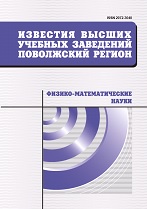|
Mathematics
Approximated methods for computation of singular and hypersingular integrals with rapidly oscillating kernels
I. V. Boykov, V. A. Esaf'Eva
Penza State University, Penza
Abstract:
Background. There are a lot of problems both in physics and technology, and directly in various sections of mathematics, in the study of which there arises the need for calculating integrals (including singular and hyper-singular) from rapidly oscillating functions. Since direct computation of such integrals is possible only in exceptional cases, it becomes necessary to develop approximate methods. The article is devoted to the construction of approximate methods for calculating singular and hyper-singular integrals, whose kernels include rapidly oscillating functions. Particular attention is paid to constructing quadrature formulas that are optimal in precision (in order). Materials and methods. The paper presents two methods for calculating singular and hypersingular integrals with rapidly oscillating kernels. One method is based on the transformation of the above-mentioned integrals to ordinary differential equations and the numerical solution of the latter. The second method consists in constructing quadrature formulas of the interpolation type. To obtain lower bounds of the error of quadrature formulas on function classes, we use the method of averaging over equidistant nodes. Results. There have been built quadrature formulas that are optimal in precision (order) for computing singular and hyper-singular integrals with rapidly oscillating kernels in Holder function classes and $W^r (M)$ where $r=1,2,...,M$ - a positive constant. The article introduces the algorithm of transformation of sungular and hyper-singular integrals into regular differential equations. Conclusions. The paper proposes methods for computing singular and hyper-singular integrals with rapidly oscillating kernels that may be applied for problem solving in physics, technology and calculus mathematics.
Keywords:
rapidly oscillating function, singular and hypersingular integrals, quadrature formulas optimal in precision (order).
Citation:
I. V. Boykov, V. A. Esaf'Eva, “Approximated methods for computation of singular and hypersingular integrals with rapidly oscillating kernels”, University proceedings. Volga region. Physical and mathematical sciences, 2018, no. 1, 3–23
Linking options:
https://www.mathnet.ru/eng/ivpnz163 https://www.mathnet.ru/eng/ivpnz/y2018/i1/p3
|

| Statistics & downloads: |
| Abstract page: | 49 | | Full-text PDF : | 12 | | References: | 17 |
|




 Contact us:
Contact us: Terms of Use
Terms of Use
 Registration to the website
Registration to the website Logotypes
Logotypes







 Citation in format
Citation in format 